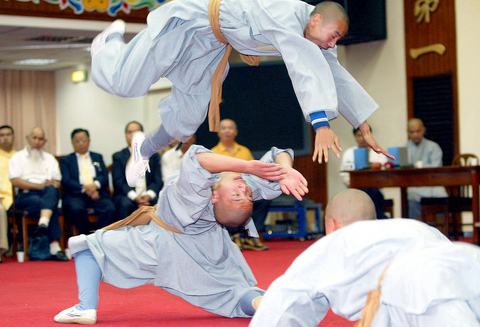After months of haggling over the details of their visit, a group of Shaolin monks from China arrived in Taiwan to exchange skills with martial arts professionals and offer free performances of their world-famous fighting techniques to the general public.
The 19-member delegation, which arrived on Thursday and is slated to depart on Sept. 1, visited the legislature yesterday to offer a treat to the media before presenting routine performances from today through Aug. 26 in Chiayi County, Kaohsiung City, Taichung County, Hsinchu City, Ilan City and Taipei City. Admission to all of their public events is free.
Before the Shaolin monks gave their performances, six kung fu practitioners from the Taipei Chinese Kung Fu Association greeted the young guests with their own individual performances.

PHOTO: CNA
The event was organized by the Chinese Shaolin Association. The association had arranged for 45 monks from the Songshan Shaolin Temple in Henan Province to teach Shaolin kung fu at summer camps.
According to the original itinerary, which would have kicked off on July 25, classes were to be open to the general public and be held at public facilities such as school playgrounds and parks. The activity had attracted more than 4,000 students who had enrolled at a cost of NT$1,200 (US$37.62) each.
At the insistence of the Mainland Affairs Council, the size of the group was downsized and the schedule was pushed back. Members must also enter and leave the country as a group, and stay in one group during the visit.
Saying that summer camps did not constitute professional exchanges, the council requested the monks limit their "exchanges" to martial arts professionals and not the general public. In addition, charging for lessons was deemed illegal.
Andrew Lin (林逸士), chairman of the Chinese Shaolin Association, said that although the event sponsor, security company Taiwan SECOM (中興保全), had bailed out, he is confident that the events will be successful.
"I'm sure Buddha will be on our side and make things alright," said the 54-year-old Lin, who converted to Buddhism and became a vegetarian at the age of 36.
According to Lin, Taiwan SECOM invested about NT$10 million in sponsorship money. While the money has already been spent, primarily on publicity, they still need another NT$10 million. The estimated budget for the original schedule was NT$50 million.
Lin said that he understands the government's concern over national security and he is aware that the council is just doing their job in accordance with the law.
However, he said that he believes the invited monks would not do anything to sabotage national security.
One monk, 18-year-old Shih Yen Lu (釋延路) from the northeastern Chinese province of Shandong, said that although their days are busy at the temple, and sometimes boring, he does not regret joining the century-old martial arts center.
"I am very happy to be with my brothers, and our masters are very nice, although they can be very strict sometimes," he said.

Alain Robert, known as the "French Spider-Man," praised Alex Honnold as exceptionally well-prepared after the US climber completed a free solo ascent of Taipei 101 yesterday. Robert said Honnold's ascent of the 508m-tall skyscraper in just more than one-and-a-half hours without using safety ropes or equipment was a remarkable achievement. "This is my life," he said in an interview conducted in French, adding that he liked the feeling of being "on the edge of danger." The 63-year-old Frenchman climbed Taipei 101 using ropes in December 2004, taking about four hours to reach the top. On a one-to-10 scale of difficulty, Robert said Taipei 101

Nipah virus infection is to be officially listed as a category 5 notifiable infectious disease in Taiwan in March, while clinical treatment guidelines are being formulated, the Centers for Disease Control (CDC) said yesterday. With Nipah infections being reported in other countries and considering its relatively high fatality rate, the centers on Jan. 16 announced that it would be listed as a notifiable infectious disease to bolster the nation’s systematic early warning system and increase public awareness, the CDC said. Bangladesh reported four fatal cases last year in separate districts, with three linked to raw date palm sap consumption, CDC Epidemic Intelligence

US climber Alex Honnold left Taiwan this morning a day after completing a free-solo ascent of Taipei 101, a feat that drew cheers from onlookers and gained widespread international attention. Honnold yesterday scaled the 101-story skyscraper without a rope or safety harness. The climb — the highest urban free-solo ascent ever attempted — took just more than 90 minutes and was streamed live on Netflix. It was covered by major international news outlets including CNN, the New York Times, the Guardian and the Wall Street Journal. As Honnold prepared to leave Taiwan today, he attracted a crowd when he and his wife, Sanni,

Two Taiwanese prosecutors were questioned by Chinese security personnel at their hotel during a trip to China’s Henan Province this month, the Mainland Affairs Council (MAC) said yesterday. The officers had personal information on the prosecutors, including “when they were assigned to their posts, their work locations and job titles,” MAC Deputy Minister and spokesman Liang Wen-chieh (梁文傑) said. On top of asking about their agencies and positions, the officers also questioned the prosecutors about the Cross-Strait Joint Crime-Fighting and Judicial Mutual Assistance Agreement, a pact that serves as the framework for Taiwan-China cooperation on combating crime and providing judicial assistance, Liang